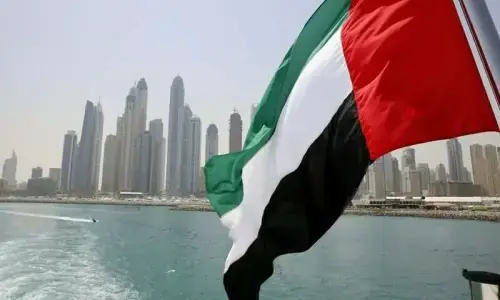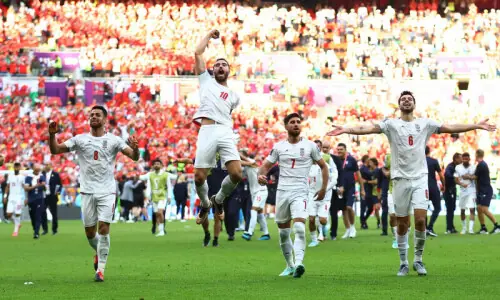THIS year, Aug 5 will mark two years since India unilaterally and illegally stripped Indian Illegally Occupied Jammu and Kashmir (IIOJK) of its special status. These two years have been a sombre reminder that our Kashmiri brothers and sisters remain under a brutal military occupation — one of a handful left in the modern era. It is also a reminder that the valiant spirit of freedom, imbued in the people of Kashmir by their forefathers through their epic struggle against Dogra rule, remains undiminished. Despite seven decades of occupation and the denial of their right to self-determination, the Kashmiris continue their steadfast demand for the right to choose their future. No amount of brutal oppression and atrocities have dented their resolve.
Pakistan and its people are united in their hearts and in their minds with our Kashmiri brothers and sisters. We have always stood for a peaceful resolution of the Kashmir dispute according to the aspirations of the people of Kashmir and in keeping with the principles of UNSC resolutions. Despite the ebb and flow of global politics, Pakistan always has, and will continue to remain committed to this cause until the Kashmiris are given this right to self-determination and therefore, their freedom.
The government continues to take steps to highlight the Kashmir cause and Indian human rights violations on the world stage. For the first time in decades, the Kashmir issue has been discussed at the UNSC. Several leaders across the world and international journalists have called out India for its human rights violations in IIOJK.
The prime minister, his cabinet, and our parliament have raised serious concerns about brutal Indian actions in IIOJK since Aug 5, 2019. I share those concerns. The situation on the ground and the unilateral and illegal actions of the occupying Indian forces demonstrate that a project to erase the Kashmiri identity is underway in IIOJK. This includes forced demographic change through arbitrary alterations in a century-old domicile law. This practice, wherever it has been used, increases bitterness in the local population against the occupier’s activities and intentions.
The struggle in Kashmir is indigenous and has enjoyed popular support against India’s military occupation.
Kashmiris are no strangers to the demographic designs of their occupiers. India first employed this strategy during the time of partition. In November 1947, close to 300,000 Kashmiri Muslims were brutally exterminated in Jammu by the maharaja’s state-sponsored Dogra paramilitaries and RSS-inspired mobs. This genocidal massacre led to the exodus and forced displacement of nearly a million Jammu Muslims. Experts claim this was a state-sponsored massacre to deliberately alter the demographic make-up of Jammu, a region where Muslims were over 60 per cent of the total population, and therefore in a clear majority. As a result of the massacre and forced displacement, Muslims in Jammu were reduced to a minority and the demographics remain artificially altered to this day. Today, many in IIOJK fear a repeat of that tragedy.
In addition to demographic change, the Indian government has passed a law to diminish the use of the Urdu language — which has been the official language for the last 131 years in the region. Muslim names of public spaces are also being changed while an effort to artificially decrease the representation of Muslims through forced delimitation is another attempt to diminish the unique identity of Kashmiris.
These actions have been made possible by the unilateral and illegal revocation of Article 370 and 35A completely against the wishes of the people of IIOJK. While Pakistan has never recognised the application of any article of the Indian constitution on IIOJK, the revocation of Article 370 and 35A have resulted in material change in the situation on the ground — a clear violation of bilateral agreements and international resolutions.
To ensure that widespread resistance by Kashmiris against these draconian actions is controlled, the Indian occupation forces have turned IIOJK into a prison like no other in the world. Today, there is one Indian soldier for every eight Kashmiris. Thousands of political leaders, teachers, activists, journalists and students remain incarcerated in prisons across India under draconian laws and trumped up charges. Many Hurriyat leaders are in frail health and their families fear for their safety.
Explainer: What India's change to occupied Kashmir's status means
The BJP government has demonstrated that its Hindutva-inspired political tendencies and actions not only threaten Kashmir’s political identity and historical legacy, but also pose a danger to regional peace and a global order based on international norms of choice and freedom. India, under the BJP, has become increasingly revisionist and hegemonic, seeking to change the status quo through the use of force and military adventurism.
To divert attention from the humanitarian catastrophe in IIOJK, India has embarked on a campaign to malign Pakistan internationally through a concerted propaganda campaign while actually sponsoring terrorism against my country, as revealed by Pakistan’s dossier on Indian-sponsored terrorism and disinformation against Pakistan. The internationally acclaimed EU DisinfoLab has revealed the manipulation and mischievous efforts to mislead the UN system and EU Parliament using fake NGOs and fake news websites to demean Pakistan. Most recently, a high Indian official has admitted to playing politics on FATF and leveraging its clout to make Pakistan stay on the grey list. All these raise important questions for Pakistan and the region. We ask ourselves if the current Indian government is a rational actor or an ideologically motivated regime that cannot be trusted.
The struggle in Kashmir is indigenous and has always enjoyed popular support against the Indian military occupation. Through its latest actions, a belligerent India has lost whatever little support it claimed to have in IIOJK. Kashmiris have always shown bravery, resilience and perseverance in the face of injustice and state brutality. They will resist Indian occupation till they achieve their political rights, guaranteed to them by the international community under UNSC resolutions.
Pakistan will continue to awaken the world conscience to the plight of the Kashmiris and I urge the nations of the world and remind them that they owe it to the people of Kashmir and to the principles of humanity to let Kashmiris decide their future for themselves as enshrined in the UNSC resolutions. Kashmir stays as an unfulfilled promise on the world conscience. The day is not far when the people of Kashmir will be free from the yolk of Indian occupation Insha’Allah.
The writer is president of the Islamic Republic of Pakistan.
Published in Dawn, August 5th, 2021































